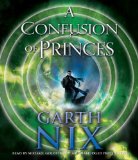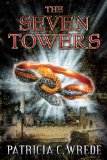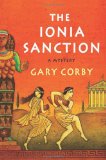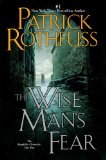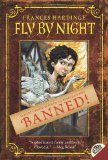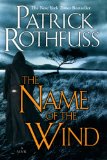 The Name of the Wind
The Name of the Wind
The Kingkiller Chronicle: Day One
by Patrick Rothfuss
DAW Books, 2007. 722 pages.
Starred Review
2011 Sonderbooks Stand-out: #2 Fantasy Fiction
This book wasn’t even on my radar until the second book came out and several of my siblings bragged on Facebook about who got their hands on it first. Then my sister Marcy posted a short quotation from the sequel, and by the language alone, I knew this writer was something special. When I went to the bookstore to purchase it, I picked it up and then wandered into the music and movies section of the store. One of the employees saw me holding The Name of the Wind and talked with me for ten minutes about how it’s her favorite book! So I was already quite sure I’d made a good choice.
Then I started reading, and right away the language pulled me in. The book has the feel of a true epic, of something sweeping and important.
The book begins in an inn with a bunch of locals sitting around and Old Cob telling stories. Looking it over after reading the book, I see lots of clues about what’s to follow. On the second page of Chapter One, you understand the significance of the title in the story that’s told of Taborlin escaping from a tower and the Chandrian.
“‘But Taborlin knew the names of all things, and so all things were his to command. He said to the stone: “Break!” and the stone broke. The wall tore like a piece of paper, and through that hole Taborlin could see the sky and breathe the sweet spring air. He stepped to the edge, looked down, and without a second thought he stepped out into the open air. . . .’
“The boy’s eyes were wide. ‘He didn’t!’
“Cob nodded seriously. ‘So Taborlin fell, but he did not despair. For he knew the name of the wind, and so the wind obeyed him. He spoke to the wind and it cradled and caressed him. It bore him to the ground as gently as a puff of thistledown and set him on his feet softly as a mother’s kiss.”
We also quickly learn that there’s something mysterious about the young, red-haired innkeeper.
“He called himself Kote. He had chosen the name carefully when he came to this place. He had taken a new name for most of the usual reasons, and for a few unusual ones as well, not the least of which was the fact that names were important to him.”
I wondered about the subtitle of the book: Day One of the Kingkiller Chronicles. Was the whole thing supposed to happen in a day? Some sort of demon appears and attacks a man, and Kote deals with it without making it obvious that he knows what he’s doing. Several days pass very quickly.
Then a traveler called the Chronicler comes on the path to the inn. In the night, he encounters Kote, who saves him from an attack of more spider-shaped demons with razor-sharp feet. When Kote takes the Chronicler to his inn, the Chronicler recognizes him as Kvothe. He came there to find him, to hear the real story behind all the tales.
Kote takes some convincing. Finally, he tells the Chronicler that the only way he will tell his story is if he has three days. Three days to prepare and tell it properly. So the first book is what he tells the Chronicler on the first day, the start of his story.
Kvothe begins his tale:
“‘In some ways, it began when I heard her singing. Her voice twinning, mixing with my own. Her voice was like a portrait of her soul: wild as fire, sharp as shattered glass, sweet and clean as clover.’
“Kvothe shook his head. ‘No. It began at the University. I went to learn magic of the sort they talk about in stories. Magic like Taborlin the Great. I wanted to learn the name of the wind. I wanted fire and lightning. I wanted answers to ten thousand questions and access to their archives. But what I found at the University was much different than a story, and I was much dismayed.
“‘But I expect the true beginning lies in what led me to the University. Unexpected fires at twilight. A man with eyes like ice at the bottom of a well. The smell of blood and burning hair. The Chandrian.’ He nodded to himself. ‘Yes, I suppose that is where it all begins. This is, in many ways, a story of the Chandrian.'”
His introduction is masterful:
“My name is Kvothe, pronounced nearly the same as ‘Quothe.’ Names are important as they tell you a great deal about a person. I’ve had more names than anyone has a right to.
“The Adem call me Maedre. Which, depending on how it’s spoken, can mean ‘The Flame,’ ‘The Thunder,’ or ‘The Broken Tree.’
“‘The Flame’ is obvious if you’ve ever seen me. I have red hair, bright. If I had been born a couple hundred years ago I would probably have been burned as a demon. I keep it short but it’s unruly. When left to its own devices, it sticks up and makes me look as if I have been set afire.
“‘The Thunder’ I attribute to a strong baritone and a great deal of stage training at an early age.
“I’ve never thought of ‘The Broken Tree’ as very significant. Although in retrospect I suppose it could be considered at least partially prophetic.
“My first mentor called me E’lir because I was clever and I knew it. My first real lover called me Dulator because she liked the sound of it. I have been called Shadicar, Lightfinger, and Six-String. I have been called Kvothe the Bloodless, Kvothe the Arcane, and Kvothe Kingkiller. I have earned those names. Bought and paid for them.
“But I was brought up as Kvothe. My father once told me it meant ‘to know.’
“I have, of course, been called many other things. Most of them uncouth, although very few were unearned.
“I have stolen princesses back from sleeping barrow kings. I have burned down the town of Trebon. I have spent the night with Felurian and left with both my sanity and my life. I was expelled from the University at a younger age than most people are allowed in. I tread paths by moonlight that others fear to speak of during the day. I have talked to gods, loved women, and written songs that make the minstrels weep.
“You may have heard of me.”
This is what you’re getting in this book. It’s only the start of an epic tale, basically the story of Kvothe’s childhood. We learn how he was brought up in a band of traveling players, incredibly quick to learn. We hear how his parents were killed and he spent years on the streets of a city, but then made it to the University. Along the way, a few of the things he mentioned above happen.
And in the frame, in the present time, grave things are afoot. There’s no telling how that will play out.
The worst thing about this series: It is not complete. Of course, I will have the joy of rereading the first two books when the third comes out. Patrick Rothfuss has a lot of loose ends to tie up, but I have no doubts that he will be able to pull it off.
This was the sort of book that I told everybody about while I was reading it. Now I’ll urge my website readers. This book is unforgettable. Read it!
Buy from Amazon.com
Find this review on Sonderbooks at: www.sonderbooks.com/Fiction/name_of_the_wind.html
Disclosure: I am an Amazon Affiliate, and will earn a small percentage if you order a book on Amazon after clicking through from my site.
Source: This review is based on my own book, purchased in a Barnes & Noble bookstore.

